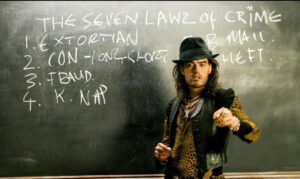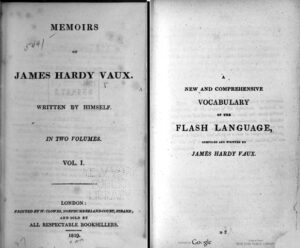
In 1819 James Hardy Vaux published ‘A New and Comprehensive Vocabulary of the Flash Language’, a compilation of the underworld slang used in late eighteenth and early nineteenth century New South Wales that was brought from Britain and Ireland.

The “vocabulary” appeared in Volume 2 pages 147-227 of Memoirs of James Hardy Vaux, Written by himself printed in London by W. Clowes (https://babel.hathitrust.org/cgi/pt?id=nyp.33433082394838, see also Simon Barnard’s 2019 book James Hardy Vaux’s 1819 Dictionary of Criminal Slang and Other Impolite Terms as Used by the Convicts of the British Colonies of Australia – with Additional True Stories, Remarkable Facts and Illustrations, Melbourne: Text Publishing.)
 Vaux was born in 1782. He was a professional thief and swindler who was transported three times in 1800, 1809, and 1830. His last recorded conviction was two years for indecent assault of an 8-year-old girl in 1839. He probably died in the 1840s.
Vaux was born in 1782. He was a professional thief and swindler who was transported three times in 1800, 1809, and 1830. His last recorded conviction was two years for indecent assault of an 8-year-old girl in 1839. He probably died in the 1840s.
As you see from the following list, lots of the slang Vaux records (about 20%) was still used in twentieth century Australia and most of it is extant today (even if you don’t move in the wrong circles).
bang up to the mark ‘smart’; bash ‘beat up’; beak ‘magistrate’; haven’t got a bean ‘no money’; beef ‘hue and cry’; blow the gaff ‘tell on, reveal’; bob ‘shilling’; body snatcher; bolt ‘run’; bounce ‘what a bouncer does’; bowled out ‘found out, removed from a position’; bunce ‘money’; cadge; chiv ‘knife’; chum; cleaned out/up ‘money/wealth gone’; clout ‘cloth’; conk ‘nose’; cove ‘person’; crabbed ‘imperfect’; crack a safe; cracksman; crack ‘interchange’; croak ‘die’; dancers ‘stairs’; dicky ‘inferior’; do someone in; do the trick ‘bring off’; dollop; drop ‘give [drop me a quid]; duds ‘apparel’ [originally limited to women]; dues ‘what’s owing’; dummy ‘fool’; earwig ‘listen in’; fancy woman ‘mistress’; fancy man ‘extra marital lover’; fence ‘receiver of stolen goods’; flash ‘smart’, ‘show, reveal’; flash language ‘slang, thieves’ jargon’; floor ‘knock someone down’; fly ‘vigilant, sharp’; frisk ‘search’; game [n.] ‘pursuit’; gammon ‘flattery, bullshit’; be good for something; grab; grub ‘food’; his nabs ‘his nibs’; hoist ‘robbery’; jemmy ‘crowbar’; job ‘undertaking’; kid ‘child’; kirk ‘church’; knap ‘steal, get’; lag ‘convict’; lamps ‘eyes’; lark ‘game, something done for fun, gain’; leary ‘suspicious’; bring to light ‘reveal’; lumbered ‘incommoded’; lush ‘drunk’; mitts ‘gloves, hands’; mug ‘face’; nail a person; nancy ‘arse’; nancy boy; needle a person; nix; nose ‘snout, grass’; out and out ‘completely’; pal ‘friend’; palm ‘bribe’, ‘palm’; patter ‘talk’; pick up someone; pigs ‘police’; pinch ‘steal’; pins ‘legs’; jug, clink ‘prison’; plummy ‘good’; post a bet ‘put up a bet’; prime ‘good, plummy’; pull ‘influence’; pull up ‘stop’; put up an idea ‘float an idea’; queer ‘counterfeit’; queer it ‘spoil it’; quid ‘pound, guinea’; racket ‘scheme’; rattler ‘coach’; rum ‘good’; school [of gamblers, etc.]; scout ‘watchman’; seedy ‘poor, shabby’; sell ‘betray’; shake ‘steal from’; sharp ‘cheat’; on the sly ‘secretively’; snitch ‘betray’; snooze; sound a person ‘try to get info from’; spin a yarn; square ‘upright, honest’; stake ‘sum of money’; stash ‘end, put way’; sticks ‘furniture’; sting ‘defraud, rob’; stink ‘uproar, outrage’; stow ‘finish, stash’; swag ‘bundle, booty’; swell ‘gentleman’; tanner ‘sixpence’; toddle ‘walk slowly, be doddery’; toddler ‘child’; togs ‘clothes’; togged out to the nines ‘well-dressed’; tools [for housebreaking, etc.]’; tooled up; topped ‘hanged’; traps ‘police’; do the trick ‘accomplish’; try it on; turn up a trump ‘turn out well’; wack [n.] ‘share’; wanted [for a crime]; weed ‘tobacco’; yarn ‘narrate’.
OK, currency is now decimal, there are more trendy slang terms for friends, and weed is more frequently used for dope than tobacco, but a surprising quantity of eighteenth-nineteenth century flash language is still in common use today. Vaux’s “vocabulary” is testament to the longevity of slang.

